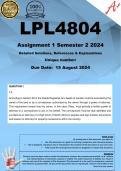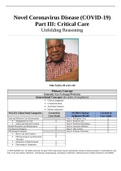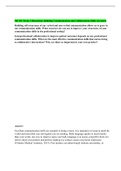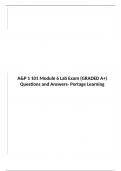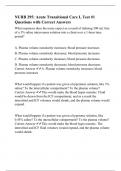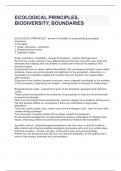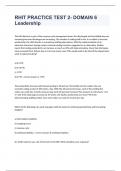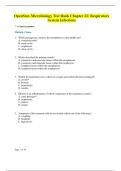RUG Marketing Managment 2022/2023
Consumer
Psychology
Paper Flashcards &
Connections between the papers
,MARKETING & CONSUMER WELL-BEING
Iyengar, S. & Lepper, M. (2000). When Choice is Demotivating: Can One Desire Too Much of a Good Thing?
LECTURE 1 Journal of Personality and Social Psychology, 79 (6), 995-1006.
Ordabayeva, N., & Fernandes, D. (2018). Better or different? How political ideology shapes preferences for differentiation in the
LECTURE 2 social hierarchy. Journal of Consumer Research, 45(2), 227-250.
Grewal, L., Wu, E. C., & Cutright, K. M. (2021). Loved As-Is: How God Salience Lowers Interest in Self-Improvement Products.
Journal of Consumer Research.
Content
Yang, H., Stamatogiannakis, A., & Chattopadhyay, A. (2015). Pursuing attainment versus maintenance goals: The interplay of self-
construal and goal type on consumer motivation. Journal of Consumer Research, 42(1), 93-108.
Cutright, K. M., & Samper, A. (2014). Doing it the hard way: How low control drives preferences for high-effort products and
LECTURE 3 services. Journal of Consumer Research, 41(3), 730-745.
Mead, N. L., Baumeister, R. F., Stillman, T. F., Rawn, C. D., & Vohs, K. D. (2011). Social exclusion causes people to spend and
consume strategically in the service of affiliation. Journal of consumer research, 37(5), 902-919.
Connections Kim, S., & Gal, D. (2014). From compensatory consumption to adaptive consumption: The role of self-acceptance in resolving self-
deficits. Journal of Consumer Research, 41(2), 526- 542.
Pham, M. T., Hung, I. W., & Gorn, G. J. (2011). Relaxation increases monetary valuations. Journal of Marketing Research, 48(5), 814-
02
LECTURE 4
Summaries
826.
Lasaleta, J. D., Sedikides, C., & Vohs, K. D. (2014). Nostalgia weakens the desire for money. Journal of Consumer Research, 41(3), 713-
729
Labroo, A & Rucker, D. (2010). The Orientation-Matching Hypothesis: An EmotionSpecificity Approach to Affect Regulation.
Journal of Marketing Research, 47(5), 955-966
Yoon, S., & Kim, H. C. (2018). Feeling economically stuck: The effect of perceived economic mobility and socioeconomic status on
LECTURE 5 variety seeking. Journal of Consumer Research, 44(5), 1141-1156.
Tully, S. M., Hershfield, H. E., & Meyvis, T. (2015). Seeking lasting enjoyment with limited money: Financial constraints increase
preference for material goods over experiences. Journal of Consumer Research, 42(1), 59-75.
Griskevicius, V., Tybur, J., & Van den Berg, B. (2010). Going green to be seen: Status, reputation, and conspicuous conservation.
LECTURE 6 Journal of Personality and Social Psychology, 98(3), 392-404
Côté, S., House, J., & Willer, R. (2015). High economic inequality leads higher-income individuals to be less generous. Proceedings of
the National Academy of Sciences, 112(52), 15838-15843
Ehrich, K. & Irwin, J. (2005). Willful Ignorance in the Request for Product Attribute Information. Journal of Marketing Research,
42(3), 266-277.
Griskevicius, V., Tybur, J., & Van den Berg, B. (2010). Going green to be seen: Status, reputation, and conspicuous conservation.
LECTURE 7 Journal of Personality and Social Psychology, 98(3), 392-404
Ehrich, K. & Irwin, J. (2005). Willful Ignorance in the Request for Product Attribute Information. Journal of Marketing Research,
42(3), 266-277.
Côté, S., House, J., & Willer, R. (2015). High economic inequality leads higher-income individuals to be less generous. Proceedings of
the National Academy of Sciences, 112(52), 15838-15843
, MARKETING MANAGEMENT RUG Literature Connections
Iyengar, S. & Lepper, M. (2000). When Choice is Ordabayeva, N., & Fernandes, D. (2018). Better or different?
Van Boven, L., & Gilovich, T. (2003). To Do or to Have?
Demotivating: Can One Desire Too Much of a Good How political ideology shapes preferences for
That Is the Question.
Thing? differentiation in the social hierarchy.
Rindfleisch, A., Burroughs, J. E., & Wong, N. (2009). The Political Self
The safety of objects: Materialism, existential
Hudders, L., & Pandelaere, M. (2012). The silver lining of insecurity, and brand connection.
materialism: The impact of luxury consumption on Choice Overload Grewal, L., Wu, E. C., & Cutright, K. M. (2021).
subjective well-being. Loved As-Is: How God Salience Lowers Interest
in Self-Improvement Products.
1) What is Consumer Psychology? 2) The Self in the Marketplace Religion
7) Materialism & Happiness
The Self-Concept
Where do values come
from? Yang, H., Stamatogiannakis, A., & Chattopadhyay, A.
1. Self-Construal (2015). Pursuing attainment versus maintenance
Griskevicius, V., Tybur, J., & Van den Berg, B.
goals: The interplay of self-construal and goal type on
(2010). Going green to be seen: Status, 2. Political Ideology
consumer motivation.
Consumer Psychology 3. Religion
reputation, and conspicuous conservation.
Self-Construal
Côté, S., House, J., & Willer, R. (2015). High
economic inequality leads higher-income 6) The Prosocial Consumer
individuals to be less generous. What Motivates Consumers?
Self-Concept Theory
Multidimensional: incorporating our 3) Compensatory Consumer
views on several aspects Behavior
Cutright, K. M., & Samper, A. (2014). Doing it the hard way: How low control
Does not always align (can be drives preferences for high-effort products and services.
Ehrich, K. & Irwin, J. (2005). Willful Ignorance in
congruent and incongruent)
the Request for Product Attribute Information.
Mead, N. L., Baumeister, R. F., Stillman, T. F., Rawn, C. D., &
Vohs, K. D. (2011). Social exclusion causes people to spend
4) Affect (feeling) and Consumer and consume strategically in the service of affiliation.
5) Scarcity and
Behavior
Consumer Behavior
Yoon, S., & Kim, H. C. (2018). Feeling economically stuck: Kim, S., & Gal, D. (2014). From compensatory
The effect of perceived economic mobility and Pham, M. T., Hung, I. W., & Gorn, G. J. (2011). consumption to adaptive consumption: The role of
socioeconomic status on variety seeking. Relaxation increases monetary valuations. self-acceptance in resolving self-deficits.
Labroo, A & Rucker, D. (2010). The Orientation-
Matching Hypothesis: An Emotion Specificity
Approach to Affect Regulation.
Tully, S. M., Hershfield, H. E., & Meyvis, T. (2015). Seeking
lasting enjoyment with limited money: Financial constraints Lasaleta, J. D., Sedikides, C., & Vohs, K. D. (2014).
increase preference for material goods over experiences. Nostalgia weakens the desire for money.
Consumer
Psychology
Paper Flashcards &
Connections between the papers
,MARKETING & CONSUMER WELL-BEING
Iyengar, S. & Lepper, M. (2000). When Choice is Demotivating: Can One Desire Too Much of a Good Thing?
LECTURE 1 Journal of Personality and Social Psychology, 79 (6), 995-1006.
Ordabayeva, N., & Fernandes, D. (2018). Better or different? How political ideology shapes preferences for differentiation in the
LECTURE 2 social hierarchy. Journal of Consumer Research, 45(2), 227-250.
Grewal, L., Wu, E. C., & Cutright, K. M. (2021). Loved As-Is: How God Salience Lowers Interest in Self-Improvement Products.
Journal of Consumer Research.
Content
Yang, H., Stamatogiannakis, A., & Chattopadhyay, A. (2015). Pursuing attainment versus maintenance goals: The interplay of self-
construal and goal type on consumer motivation. Journal of Consumer Research, 42(1), 93-108.
Cutright, K. M., & Samper, A. (2014). Doing it the hard way: How low control drives preferences for high-effort products and
LECTURE 3 services. Journal of Consumer Research, 41(3), 730-745.
Mead, N. L., Baumeister, R. F., Stillman, T. F., Rawn, C. D., & Vohs, K. D. (2011). Social exclusion causes people to spend and
consume strategically in the service of affiliation. Journal of consumer research, 37(5), 902-919.
Connections Kim, S., & Gal, D. (2014). From compensatory consumption to adaptive consumption: The role of self-acceptance in resolving self-
deficits. Journal of Consumer Research, 41(2), 526- 542.
Pham, M. T., Hung, I. W., & Gorn, G. J. (2011). Relaxation increases monetary valuations. Journal of Marketing Research, 48(5), 814-
02
LECTURE 4
Summaries
826.
Lasaleta, J. D., Sedikides, C., & Vohs, K. D. (2014). Nostalgia weakens the desire for money. Journal of Consumer Research, 41(3), 713-
729
Labroo, A & Rucker, D. (2010). The Orientation-Matching Hypothesis: An EmotionSpecificity Approach to Affect Regulation.
Journal of Marketing Research, 47(5), 955-966
Yoon, S., & Kim, H. C. (2018). Feeling economically stuck: The effect of perceived economic mobility and socioeconomic status on
LECTURE 5 variety seeking. Journal of Consumer Research, 44(5), 1141-1156.
Tully, S. M., Hershfield, H. E., & Meyvis, T. (2015). Seeking lasting enjoyment with limited money: Financial constraints increase
preference for material goods over experiences. Journal of Consumer Research, 42(1), 59-75.
Griskevicius, V., Tybur, J., & Van den Berg, B. (2010). Going green to be seen: Status, reputation, and conspicuous conservation.
LECTURE 6 Journal of Personality and Social Psychology, 98(3), 392-404
Côté, S., House, J., & Willer, R. (2015). High economic inequality leads higher-income individuals to be less generous. Proceedings of
the National Academy of Sciences, 112(52), 15838-15843
Ehrich, K. & Irwin, J. (2005). Willful Ignorance in the Request for Product Attribute Information. Journal of Marketing Research,
42(3), 266-277.
Griskevicius, V., Tybur, J., & Van den Berg, B. (2010). Going green to be seen: Status, reputation, and conspicuous conservation.
LECTURE 7 Journal of Personality and Social Psychology, 98(3), 392-404
Ehrich, K. & Irwin, J. (2005). Willful Ignorance in the Request for Product Attribute Information. Journal of Marketing Research,
42(3), 266-277.
Côté, S., House, J., & Willer, R. (2015). High economic inequality leads higher-income individuals to be less generous. Proceedings of
the National Academy of Sciences, 112(52), 15838-15843
, MARKETING MANAGEMENT RUG Literature Connections
Iyengar, S. & Lepper, M. (2000). When Choice is Ordabayeva, N., & Fernandes, D. (2018). Better or different?
Van Boven, L., & Gilovich, T. (2003). To Do or to Have?
Demotivating: Can One Desire Too Much of a Good How political ideology shapes preferences for
That Is the Question.
Thing? differentiation in the social hierarchy.
Rindfleisch, A., Burroughs, J. E., & Wong, N. (2009). The Political Self
The safety of objects: Materialism, existential
Hudders, L., & Pandelaere, M. (2012). The silver lining of insecurity, and brand connection.
materialism: The impact of luxury consumption on Choice Overload Grewal, L., Wu, E. C., & Cutright, K. M. (2021).
subjective well-being. Loved As-Is: How God Salience Lowers Interest
in Self-Improvement Products.
1) What is Consumer Psychology? 2) The Self in the Marketplace Religion
7) Materialism & Happiness
The Self-Concept
Where do values come
from? Yang, H., Stamatogiannakis, A., & Chattopadhyay, A.
1. Self-Construal (2015). Pursuing attainment versus maintenance
Griskevicius, V., Tybur, J., & Van den Berg, B.
goals: The interplay of self-construal and goal type on
(2010). Going green to be seen: Status, 2. Political Ideology
consumer motivation.
Consumer Psychology 3. Religion
reputation, and conspicuous conservation.
Self-Construal
Côté, S., House, J., & Willer, R. (2015). High
economic inequality leads higher-income 6) The Prosocial Consumer
individuals to be less generous. What Motivates Consumers?
Self-Concept Theory
Multidimensional: incorporating our 3) Compensatory Consumer
views on several aspects Behavior
Cutright, K. M., & Samper, A. (2014). Doing it the hard way: How low control
Does not always align (can be drives preferences for high-effort products and services.
Ehrich, K. & Irwin, J. (2005). Willful Ignorance in
congruent and incongruent)
the Request for Product Attribute Information.
Mead, N. L., Baumeister, R. F., Stillman, T. F., Rawn, C. D., &
Vohs, K. D. (2011). Social exclusion causes people to spend
4) Affect (feeling) and Consumer and consume strategically in the service of affiliation.
5) Scarcity and
Behavior
Consumer Behavior
Yoon, S., & Kim, H. C. (2018). Feeling economically stuck: Kim, S., & Gal, D. (2014). From compensatory
The effect of perceived economic mobility and Pham, M. T., Hung, I. W., & Gorn, G. J. (2011). consumption to adaptive consumption: The role of
socioeconomic status on variety seeking. Relaxation increases monetary valuations. self-acceptance in resolving self-deficits.
Labroo, A & Rucker, D. (2010). The Orientation-
Matching Hypothesis: An Emotion Specificity
Approach to Affect Regulation.
Tully, S. M., Hershfield, H. E., & Meyvis, T. (2015). Seeking
lasting enjoyment with limited money: Financial constraints Lasaleta, J. D., Sedikides, C., & Vohs, K. D. (2014).
increase preference for material goods over experiences. Nostalgia weakens the desire for money.


